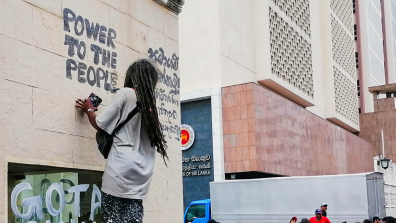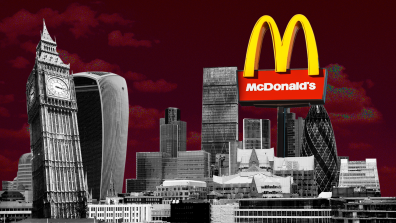Ten reasons why unions are important
Today, working people in the UK are facing an ongoing cost-of-living crisis, a rise in zero-hours contracts and big corporations putting their profits above the wellbeing of workers. Trade unions won us many of the rights we enjoy today, and now more than ever, we need unions to safeguard workers’ rights.
War on Want is proud to stand in solidarity with workers in the UK and around the world — many of whom face intimidation and retaliation for organising into trade unions.
There are so many reasons why unions are important — here are just ten of them:
1. Unity is strength
Unions enable workers to come together as a powerful, collective voice to communicate with management about their working terms and conditions — and to push for safe, fair and decent work.
Working people need the protection of a union now more than ever. Many employers around the world have tried to divide workers and cut through workers’ rights legislation by shifting the focus away from their own responsibilities towards their workers.
1 million workers in the UK today are stuck on zero-hours contracts1 — which employers argue give workers flexibility — but in reality, mean that workers can’t control their own hours or salary, while employers avoid providing benefits like holiday and sick pay.
Global corporations and fashion brands are keen to point to the thousands of jobs they create. At the same time, they distance themselves from the workers in their Global South supply chains, who produce the products they profit from. Without ensuring the essential rights of workers are respected and maintained, this is not decent work.
Decent work is about the right to employment to begin with, and that employers should provide a living wage for the employee and the family. It should ensure workplace safety without discrimination and the right of employees to organise as trade unions.
2. Better terms and conditions
Workers who join a trade union are more likely to have better terms and conditions than those who do not, because trade unions negotiate for their members through collective bargaining agreements — the result of negotiations between trade unions and employers. Collective bargaining agreements give workers strength in numbers, and protect them from bad management practices.
All aspects of working life should be the subject of discussion and agreement between employers and employees under the protection of a trade union. Trained representatives of the union lead these negotiations on behalf of employees. Unions work constructively with progressive employers to ensure that company changes affecting employees are in the interest of both workers and employer.
3. More holiday
Unions won the right for workers to have paid holidays. The average trade union member in the UK gets more annual leave a year than a non-unionised worker.
4. Higher wages
You earn more in a unionised workplace. Trade union members in the UK earn on average 6.5%2 more than non-unionised members. This is the power of collective bargaining.
While many companies post record profits, workers in the UK are feeling the devastating effects of years of real-term pay decreases and cuts to vital public services. Despite a change of government in 2024, too many working people are still suffering from an ongoing cost-of-living crisis. While companies post record profits, unions are fighting to protect workers from job losses or 'hire and fire' practices.

The new Employment Rights Bill – due to come into effect in 2026 – is a chance to re-balance power between workers and their employers. The proposed changes include ending exploitative zero-hours contracts by having rights to guaranteed hours, and enabling more flexibility for parental leave. Unions will be sitting down with the UK government to ensure that the profits of corporations aren’t put before workers’ rights.
Strike action is always a last resort — no worker wants to go on strike and lose pay. But throughout history, union-organised strike action has been a crucial tactic for workers in securing fair pay and working conditions.
Since 2020, Amazon workers across the world have taken strike action against Amazon's union-busting tactics and for fair pay. Amazon makes billions every year, but it doesn’t pay its fair share of taxes — or living wages for its workers.
Amazon spent millions trying to keep us from forming a union, and that tells you everything. They know our power lies in standing together, and they fear what happens when we do. A union isn’t just about better wages or conditions—it’s about dignity, respect, and making sure no worker has to face this company alone.
5. Equal opportunities, and protection against discrimination
Unions fight for equal opportunities in the workplace. Trade unions have fought for laws that give rights to workers: the minimum wage, maximum working time, paid holidays, equal pay for work of equal value as well as anti-discrimination laws.
It is the trade union movement that is fighting back against the discriminatory and unjust practices of our broken economic system. In Sri Lanka, War on Want’s trade union partner, Free Trade Zone and General Service Employees Union (FTZ & GSEU), has been at the forefront of battling for workers for over 30 years. So-called ‘free-trade zones’ have eroded the rights of workers around the globe; in Sri Lanka, as elsewhere, it is mainly women who are most affected by reduced regulations and weak worker protections.
Sexual harassment at work is a global problem. Despite recent reports of industrial-scale sexual harassment across UK workplaces – including Harrods and McDonalds – the Bakers, Food and Allied Workers Union (BFAWU) President Ian Hodson says “there isn’t enough of a deterrent to make employers actually serious about tackling it… companies deliberately time-out sexual harassment complaints to deter workers who have been brave and courageous enough to come forward.”
Workers in the BFAWU have come together with the shopworkers’ union Usdaw to launch a new campaign 'Sexual Harassment - Call It Out'. If successful, employers will be legally required to report sexual harassment and violence to regulators – in a similar way to how work-related accidents must be reported to health and safety regulators.

6. Better parental leave
Unions are responsible for securing and improving maternity, paternity, shared parental and carer leave for millions of workers.
In the UK, unionised workplaces are much more likely to have maternity, paternal and carer leave policies in place which are more generous than the statutory minimum.
7. Security and stability
Trade union members are more likely to stay in their jobs for longer. If they have a problem at work with employment contracts, harassment, redundancy, pensions or discrimination they know the union has their back.
8. Health and safety
Unionised workplaces are safer workplaces. Every year, unions train 10,000 workers in health and safety3. Local safety representatives, appointed by trade union shops, deal with issues ranging from stress and mental health issues to hazardous substances, representing their colleagues’ health and safety interests to management.

9. Legal support
If you have a problem at work, unions can offer legal services and advice.
In situations such as disciplinary and grievance hearings, your union representative can give you expert advice, support and representation from start to finish. Unions have legal teams who will make sure you are treated fairly and won’t charge you legal fees. Your union will be there for you whether the problem is with employment contracts, harassment, redundancy, pensions or discrimination.
10. Having someone in your corner
As a union member you are part of something bigger — and have the support of the union when you need it.
Trade unions are part of an international movement. Global worker solidarity is crucial to ending the worst abuses and injustice working people face, and to push back against poverty, climate breakdown and inequality. War on Want regularly asks our affiliates from the UK trade union movement to stand in solidarity with other workers across the world in their own struggles to protect their livelihoods and right to organise.
Workers against poverty
War on Want believes that poverty is political. It is the result of decisions made by those who hold power — governments and corporations — and a broken economic system which generates increasing wealth and power for elites at the expense of the majority of people on this earth. Unions have been central to War on Want’s work throughout our history as they are crucial to the fight against global poverty. We know that around the world, organised workers achieve more collectively than they can as individuals.
Around 700 million people live in extreme poverty today. Most of them are workers, particularly women workers. Trade unions are essential to fighting poverty and inequality, whether by making corporations and the super-rich pay their fair share of tax, or by securing living wages and equal pay.
Unions are at the heart of discussions about the impact of climate breakdown on workers, and pushing for a just transition away from fossil fuels that ensures the poorest aren’t paying for the costs of the climate crisis — which they did the least to create.
When over 33 million people faced devastating flooding in Pakistan in 2022 – made worse by climate breakdown — workers’ rights groups stepped up to help. Our partner, the Labour Education Foundation (LEF) — a workers rights movement set up by trade unionists — gave emergency support to working class people impacted by flooding. War on Want launched an emergency appeal to support LEF’s working, raising over £23,000.
Our partnerships with workers’ associations and trade unions focus on building strong, representative and effective worker-led organisations that have the knowledge and skills to create and use opportunities to engage with government and employers to realise safe, decent work. War on Want will continue to work with our affiliates here in the UK and our partners representing and organising workers across the Global South.
First published on 12 Feb 2018, updated in Feb 2025.




